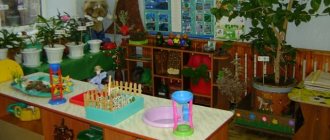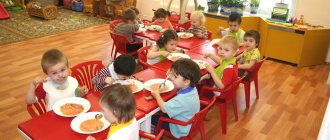Children and games
There are a huge number of topics for conversations with parents. So, you can talk about anything. But it is important to talk about how ready the child is for role-playing games with peers, how he joins the play group and whether he knows how to behave in society with other kids. Consultations for parents in preschool educational institutions in this section can be conducted on the following topics:
- Selection of toys for children.
- About role-playing games and their meaning.
- Development and learning in the game.
- The role of toys in a child's life.
- Why you need to play with your child.
Here the teacher can advise on how to choose the right toys for a child and which ones are harmful. It is also important today to talk about the role of electronic gadgets in a child’s life. After all, they are closely integrated into the life of a modern child.
Preparatory group. Senior preschool age. Children 6-7 years old
Consultation for parents “Game as a means of developing the legal education of children of senior preschool age” Game as a means of developing the legal education of children of senior preschool age. The consultation was prepared by : Vasilchuk S.V. educator Raising a child in accordance with the requirements of society is a necessary component of the process of preparing a person for future active...
Consultation “The Magic World of Theater” for senior preschool age Municipal “Slantsevskaya Secondary School No. 6”
preschool department
(senior preschool age)
Author of the development: teacher of the highest qualification category Andreyanova Nadezhda Petrovna, Slantsy, 2021 Introduction Relevance of problems related to moral -…
The child and the learning process
Consultations for parents in preschool educational institutions may also concern the educational process. After all, children in kindergarten learn and receive more and more new knowledge every day. What topics are important to pay attention to in this section:
- We instill a love of books and reading.
- How to develop your child's creativity.
- Principles of familiarization with the surrounding world.
- Left-handed child: special or the same as everyone else.
- Preparation for school.
Educators need to convey to parents the fact that children should learn not only in kindergarten. You don't have to study at the table and in front of books. So, you need to explore the world by playing on the street or even just by talking. Any conversation between parents and baby should be information-rich and useful. After all, during the kindergarten age, the baby absorbs maximum information and receives all its thorough knowledge.
Psychological characteristics of children
When considering various topics of consultation for parents, preschool educational institutions, or rather the workers themselves, including psychologists, should talk with parents about the psychological characteristics of children. Here we need to focus on the fact that all children are different, and in one team there can be children from a variety of families, including disadvantaged ones. Approximate topics for conversation:
- Aggressive kids.
- The process of a child's adaptation to kindergarten.
- Stubbornness and whims.
- The influence of parents on the formation of the baby’s attitudes and the child’s way of life.
- Does a child need frames?
- How to raise a good person.
Lecture for parents in kindergarten
Lecture for parents “The Profession of Being a Parent”
Description: The publication offers techniques and forms for organizing and holding the first meeting with parents. This material will be useful for educators and class teachers. Topic: “Profession of being a parent” Goal: formation of trusting and friendly relationships between parents and children. Objectives: To develop the pedagogical competence of parents by increasing the level of pedagogical culture of parents; using the educational potential of parents to teach and raise children with disabilities. Help parents understand and get to know their children. Equipment: light music before the meeting, poster “Educating does not mean saying good words to children, but first of all living like a human being.” (A. N. Ostrogorsky), envelopes with children's answers, blank sheets, reminders, proverbs, ritual candle. Progress of the first meeting. Teacher. Hello, dear parents! Today we are starting a lecture with you, which will consist of a number of conversations and workshops, where we will talk to you about parental relationships, family and home, their meaning in the lives of our children and why we sometimes do not understand our children. Together we will look for ways to solve some of the problems that arise: the predominance of an authoritarian or contradictory parenting style in relationships; children's anxiety; lack of mutual trust and understanding in families. First of all, let's understand that parental relationships are a system of various feelings towards the child, behavioral stereotypes practiced in communicating with him, the peculiarities of perception and understanding of the character and personality of the child, his actions. You and I know that for a child, family is a whole world in which he lives and acts: he learns to love and hate, rejoice and sympathize. At one time, Dahl wrote that “A family is a collection of close relatives living together, parents with children.” For a long time, people spoke about home and family with love and respect. Remember, people say: (parents finish the proverbs) It’s good at a party,...(but it’s better at home) There is discord in the family,...(I’m still not happy at home) It’s good everywhere,...(but it’s better at home) The whole family is together,...(so the soul is in place) It is not the stove that warms the house... (but love and harmony) There is no kinder person... (father and mother) Teacher. You should always remember that the family is the place not only of birth, but also of its formation. What a child acquires from the family during childhood, he retains for a significant part of his life. It lays the foundations of the child’s personality. Without an alliance with children, without your support and help, the child will not be happy and healthy. Family means happiness, love and luck, Family means trips to the country in the summer. Family is a holiday, family dates, gifts, shopping, pleasant spending. The birth of children, the first step, the first babble, Dreams of good things, excitement and trepidation. Family is something we share among everyone. A little bit of tears and laughter for everyone. Rise and fall, joy, sadness, Friendship and quarrels, the stamp of silence. Family is work, caring for each other. Family means a lot of housework. Family is important! Family is difficult! But it is impossible to live happily alone! Family is happiness, family is home. Where they love and wait, and do not remember evil. Practical task “Memo to parents.” Teacher. I suggest you, supplementing the sentences written on your pieces of paper, create a memo for all parents (parents have one sentence each). - If a child is constantly criticized, he learns (to hate). - If a child lives in hostility, he learns (to be aggressive). - If a child is constantly reproached, he learns (to live with guilt). - If a child lives in an atmosphere of understanding, he learns (to understand others). - If a child is praised, he learns (to be grateful). - If a child grows up in honesty, he learns (to be fair). — If a child grows up in safety, he learns (to have faith in people). — If a child is supported, he learns (to value himself). - If a child is ridiculed, he learns (to be withdrawn). - If a child lives in understanding and friendship, he learns (to find love in the world). Teacher. I really hope that these reminders will be useful to you in different situations in raising children. As parents, we must always remember that children enter into certain relationships with us, which can have both a positive and negative impact on them. As a result of these relationships, the child becomes friendly and sociable, or, conversely, anxious, callous, withdrawn and even angry. A lot depends on the behavior of parents. A person can acquire various professions, but one of the main professions is the profession of being a parent. If parents strive to comprehend the science of fatherhood and motherhood, if their behavior and actions are reasonable, there is undoubtedly a chance to raise their child happy, healthy, and smart. Dear parents, we spend a lot of time at work. Our concerns about feeding, clothing, and creating certain benefits are understandable. And with all these worries, we don’t have enough time to talk with the child, hear about what’s going on in his child’s soul, say a few kind, encouraging words to the child, and sometimes just caress him. Psychologists say that in order for a child to feel happy, he needs to be stroked on the head, hugged, approved 7 times during the day, i.e. through physical touch, confirm the words so necessary for the child: “I love you, you are very dear to me.” Let's try not to forget about this. I suggest you do a short workshop. Practical task “Kind words”. Try to use the child’s name to find words for him that characterize his character, personality traits, and abilities. For example, N - reliable, gentle A - neat, active D - kind, conscientious I - bright, clear Teacher. You see how many kind words you have found for your child. Don’t waste time with your children, see the adults in them, stop quarreling and getting angry, try to make friends with them. Try not to reproach them, learn to listen to them and understand. Warm them with your warmth, Let the house become a fortress for them. Try and search with them, Talk about everything in the world, Always guide them invisibly, And help them in all matters. Learn to trust children - Every step does not need to be checked, Respect their opinions and advice, Children are wise men, don’t forget. Adults, have hope in your children and love them with all your soul in a way that is impossible to describe. Then you won’t lose your children! Practical task “Do you know your child”? Teacher. Now, we will do a small task with you. Your task, dear parents, is to answer the questions, and then you will compare your answers with the children’s answers. Workshop questions: — What is your child’s favorite activity? - Who do you think is the most important person in the family, according to the child? — What does your child like to eat most? — Interesting TV shows that your child watches. — What is your child’s favorite book? — Write the name of your child’s best friend or girlfriend. — Your child’s favorite activity. Teacher. Now open the envelopes and take out your children’s answers to these same questions. Compare the results of the work with the results of the children... Great, those whose answers completely coincided, but those who didn’t succeed, don’t despair, it’s not too late to get to know your child better. Practical task “Parental attitudes”. Teacher. You all know that parental attitudes play a big role in the development of a child. What does parental settings mean? (Parents’ opinions) That’s right, parental attitudes are verbal appeals, requests, and assessment of the child’s actions. Parental attitudes can be both negative and positive. Therefore, our task is to avoid attitudes that may subsequently manifest themselves negatively in the child’s behavior. I propose to change negative attitudes into positive ones that develop the child’s faith in himself and in his own strength. Parental instructions: - Get out of my sight, I don’t want to talk to you. (Come to me, let's figure it out together). - Don’t be afraid of anything, don’t give in to anyone, give change. (Keep yourself in check, treat people the way you would like people to treat you). - When will you learn? (I will help you). - What would you do without me? (What would we do without you?) - Well, why were you born? (What a blessing that we have you!) - If you do this, no one will want to be friends with you. (How you treat people is how they will treat you). Teacher. As you can see, not everything is so simple. Dear parents, remember that you should not give your children negative attitudes. If you do make a mistake, then hurry to correct the situation by replacing the negative attitude with a positive one. It depends on you, to a large extent, how your child will grow up; school can only help you find a way out of a difficult situation. But you need to remember that your real actions, your behavior have the greatest influence on the formation of the child’s personality. Try to be an example for your children and you will succeed. I would really like to read you a poem that confirms everything we talked about today. A child learns from what he sees in his home. His parents are his example! Whoever is rude in front of his wife and children, Who loves the language of debauchery, Let him remember that he will receive from them with interest everything that he teaches them. It was not the wolf who raised the sheep, it was the father who gave the crab the gait! If children see us and hear us, we are responsible for our deeds. And for the words: it is easy to push children down a bad path. Keep your house in decency, so as not to repent later. /Sebastian Brant/. Teacher. I propose to end our meetings with the farewell ritual “Candle in a circle”, passing the candle, we will try to answer each other’s questions. For example: “What did you like and remember most today? How are you feeling now? How did your feelings change throughout the meeting? What would you like to hear about at the next meeting,” etc.
We recommend watching:
Adaptation in kindergarten. Consultation for parents Consultation for parents of preschool educational institutions. Research activities at home Visual impairment in children and their prevention Experience of working with parents in kindergarten
Similar articles:
Interaction between teacher and parents in kindergarten
Consultation for parents of kindergarten “Going to the store with a child”
Consultation for parents. Traveling with a child in summer
Consultation for parents “Bicycle and child”
Types of family education and their characteristics
Communication with the outside world
Consultations for parents in preschool educational institutions should be useful. Teachers should not forget about this. So, you can conduct a set of conversations that will tell moms and dads how to properly teach their child to relate to nature and the environment. A huge number of different problems arise here:
- If there is an animal in the house.
- What is nature and its role in human life.
- We keep the environment clean.
- Let's help our smaller friends.
- Caring for nature is a human priority.
It is very important to instill in a little person the right attitude towards nature. These topics are especially relevant today, when the environment is increasingly suffering from the development of technological progress and direct human actions.







